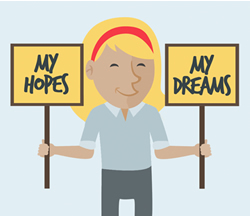Kathy Caprino says individuals often misconstrue the idea of ‘finding meaning’ in work, thinking that unless we’re having a huge, direct impact on people, our work isn’t meaningful.
 I recently had a fascinating conversation with a friend who had just taken my assessment on what I call The Six Dominant Action Styles.
I recently had a fascinating conversation with a friend who had just taken my assessment on what I call The Six Dominant Action Styles.
The assessment is based on research through my coaching and training work with thousands of professionals around the world.
It aims to help people recognise their dominant, preferred style in pursuing and completing goals in life and work.
I developed this assessment expressly to help people understand their natural, inherent style towards action, so they can honour it more fully.
In doing so, we’re more able to appreciate ourselves and our differences and embrace that difference to support what we care about.
When we can find work and environments that allow us to fully leverage our styles, then we experience more joy, reward and engagement — and also meaning and purpose — in our careers.
Additionally, when we gain awareness of how our style is not appreciated or respected at work, we have greater choice in what to do about that.
It’s extremely painful and demoralising when our real, authentic self has to be suppressed in order for us to succeed.
As an example, I recall 18 years ago when I was a corporate vice president in a direct marketing firm.
The management team were assembled offsite during which we took the Myers-Briggs test, and discussed the findings and their implications.
My results revealed that I was an ENTJ type (Extraversion + Intuition + Thinking + Judging).
While I had answered every question as honestly as I could, I felt there were key aspects of the ENTJ categorisation that didn’t represent me.
I approached the lead facilitator, and shared this with him.
I asked if he had any insight as to why this type felt wrong to me, given I had answered all the questions as honestly as I could.
He said something that stuck a deep chord that I’ll never forget.
He mentioned that, at times in our lives and careers, we can unconsciously modify ourselves, and our styles, behaviour and even our beliefs, in order to fit in with the dominant culture.
We see signs of this modification everywhere throughout the fabric of society.
He mentioned that almost the entire leadership team of my company was also ENTJ and it was possible that I had unconsciously shifted myself in order to fit it.
That went a long way to explaining why I felt that this work and culture was so challenging for me, emotionally and psychologically.
Fast forward to my friend.
In life, she seems to display ‘Researcher’ tendencies, but her results from the action style quiz showed her to be a ‘Striver’.
It became clearer as we talked that her penchant for in-depth researching of information, strategies and ideas regarding her life and her family’s situation was a way of helping her strive to do the right thing.
To make a positive difference in her family’s life and to support them in ways she could feel good about and be proud of.
Then she said this.
“In the assessment I found there was a lot of probing about doing work with meaning.
“While I’d like to have a career that has meaning for others, I know it doesn’t matter that much to me.
“For years, I worked on blood analysers and I was fine with that.
“I figured it helped people in the end, but it isn’t like helping people directly.”
Individuals often misconstrue the idea of ‘finding meaning’ in work, thinking that unless we’re having a huge, direct impact on people, our work isn’t meaningful.
To the contrary, finding meaning and purpose in our work can take many different forms, and doesn’t have to be about helping people directly.
If you’re wondering whether your work is meaningful, here are four quick ways to recognise how your work brings meaning and purpose to your life.
My work helps me help my family:
We don’t have to make a huge impact on thousands of people to be doing work of meaning.
Putting food on the table; helping your children achieve their educational dreams; helping to pay for medical treatment that’s desperately needed; taking a family vacation that builds beautiful lasting memories.
These are all ways that your work — and the money you earn — are meaningful to you and your family.
My work allows me to use my talents:
Using your innate talents and skills in your work is another way to derive meaning.
Your unique perspective, experience and capabilities make you extremely valuable in the workplace and to others.
Embrace and use those talents fully.
My work supports something bigger:
As my friend who worked with blood analysers mentioned, she knew it helped people in the end.
Each task that we engage in has a ripple effect that supports a larger picture.
Just because your focus may be narrow doesn’t mean you are not contributing to something much bigger that makes a difference in the world.
My work lets me be me:
As Maria Nemeth shares in her book, The Energy of Money: “We are all happiest when we are demonstrating in physical reality what we know to be true about ourselves.
“When we are giving form to our life’s intentions in a way that contributes to others.”
When you can be who you really are, leverage your talents and skills, and use them in activities that are enjoyable and in some way support a cause or outcome that you care about, then there is true meaning in your work.
*Kathy Caprino runs a leadership and career coaching and consulting firm for women. A therapist and coach, she has worked with more than 10,000 emerging women leaders.
This article first appeared on Kathy’s blogsite.











